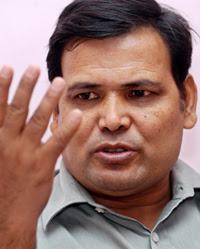 Already facing multi-frontal challenges from party dissidents, Maoist supremo Prachanda now seems to be at odds with his chief representative in the interim government.
Already facing multi-frontal challenges from party dissidents, Maoist supremo Prachanda now seems to be at odds with his chief representative in the interim government.Information and Communication Minister Krishna Bahadur Mahara asserted the other day that the elections to the constituent assembly will be held as scheduled on November 22. He spoke after Prachanda denied published reports quoting him as demanding another postponement of the balloting.
Maoist No.2 Dr. Baburam Bhattarai, in subsequent comments, indicated that Prachanda’s denial was not really, well, a denial. When the party can’t find an official spokesperson, you are bound to have all kinds of people speaking from all sides of their mouths.
As the spokesman for the interim government, Mahara was perhaps only reiterating the state’s official position on the controversial polls. Yet in many instances in the past, where his party’s position was at variance with the government’s, Mahara chose to maintain a stoic silence.
This sudden propensity for finality, therefore, raises a deeper question. Does Mahara symbolize a distinctive current within the fractious ex-rebels?
A member of the first parliament after the 1990 changes, Mahara represented a forerunner of the Maoists. Before that, during the referendum years, we know him as an active student leader. What Mahara’s official biography doesn’t reveal is that he was once a member of the Nepali Congress student wing.
It’s in this context that Mahara’s recent purported contacts with Prakash Koirala, a minister in King Gyanendra’s cabinet, becomes relevant. As B.P. Koirala’s politically prominent son, Prakash was the man who liaised with Nepali Congress youths. If moderation is what this Maoist now espouses, then he’s probably in good company.
As spokesman for the Maoists until he joined the government, Mahara sought to justify to national and international audiences the imperative of a bloody and destructive armed rebellion to restructure one of the world’s poorest states. Many of those who dismissed the substance of his arguments couldn’t help admire his persistence.
After the collapse of the royal regime, Mahara stressed the urgency of unity between the Seven Party Alliance (SPA) and the Maoists for at least a decade. He was expected to become the principal deputy premier in the interim government.
But somewhere along the peace process the Maoists – as if to heed his call – ceased to be a coalition partner with the SPA, settling instead for a status as the eighth member of the ruling establishment. If Mahara was wounded by this sudden downgrading, he surely couldn’t let the rest of the country know.
As the Prachanda-Baburam and Kiran-Badal factions slug it out for the spokesman’s job, Mahara probably sees some virtue in the full mainstreaming of the ex-rebels at a personal level. Once again, Cambodia becomes instructive here. Our man from Rolpa, the cradle of the world’s first post-communist Red uprising, might be too prominent a Maoist to become a Nepalese Hun Sen.
But would that be sufficient to deter him from pursuing the full mainstreaming of his party – or at least a faction of it? Were Prachanda ever to act on his repeated threats to pull out of the government, Mahara would be the man to watch.
